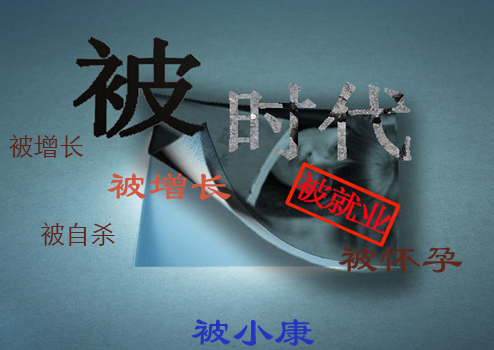“Passive era”的版本间的差异
来自China Digital Space
| 第3行: | 第3行: | ||
The term, “era of the passive tense” signifies the present, a time when euphemistic labels are given to actions that belie the underlying compulsion behind those actions. | The term, “era of the passive tense” signifies the present, a time when euphemistic labels are given to actions that belie the underlying compulsion behind those actions. | ||
| − | In Chinese, the grammatical construction bei-X means that one was compelled to do X. Netizens have coined a [[number of terms]] using this construction that have become widely used, giving rise to the term, "the era of ''bei''" or, "the era of the passive tense." Examples of these terms include'' bei''-suicide (suicided), ''bei''-happy (happified), and ''bei''-invited to tea (invited to tea by the internet police). | + | In Chinese, the grammatical construction bei-X means that one was compelled to do X. Netizens have coined a [[number of terms]]#REDIRECT [[bei-represent, bei-suicide, bei-increased, bei-GFW, bei-XX]] using this construction that have become widely used, giving rise to the term, "the era of ''bei''" or, "the era of the passive tense." Examples of these terms include'' bei''-suicide (suicided), ''bei''-happy (happified), and ''bei''-invited to tea (invited to tea by the internet police). |
“被时代”里,有人被“××”,就一定有人在对别人施以“××”。一方的权利得不到主张,被肆意侵犯,必定会有一方在压制别人享有权利,在侵犯别人的权利。 | “被时代”里,有人被“××”,就一定有人在对别人施以“××”。一方的权利得不到主张,被肆意侵犯,必定会有一方在压制别人享有权利,在侵犯别人的权利。 | ||
[[File:Eraofpassivetense.jpg|600px|thumb|left|A number of ''bei[[constructions'']].]] | [[File:Eraofpassivetense.jpg|600px|thumb|left|A number of ''bei[[constructions'']].]] | ||
2010年11月8日 (一) 05:52的版本
被时代(bèi shí dài): Era of the passive tense
The term, “era of the passive tense” signifies the present, a time when euphemistic labels are given to actions that belie the underlying compulsion behind those actions.
In Chinese, the grammatical construction bei-X means that one was compelled to do X. Netizens have coined a number of terms#REDIRECT bei-represent, bei-suicide, bei-increased, bei-GFW, bei-XX using this construction that have become widely used, giving rise to the term, "the era of bei" or, "the era of the passive tense." Examples of these terms include bei-suicide (suicided), bei-happy (happified), and bei-invited to tea (invited to tea by the internet police).
“被时代”里,有人被“××”,就一定有人在对别人施以“××”。一方的权利得不到主张,被肆意侵犯,必定会有一方在压制别人享有权利,在侵犯别人的权利。





